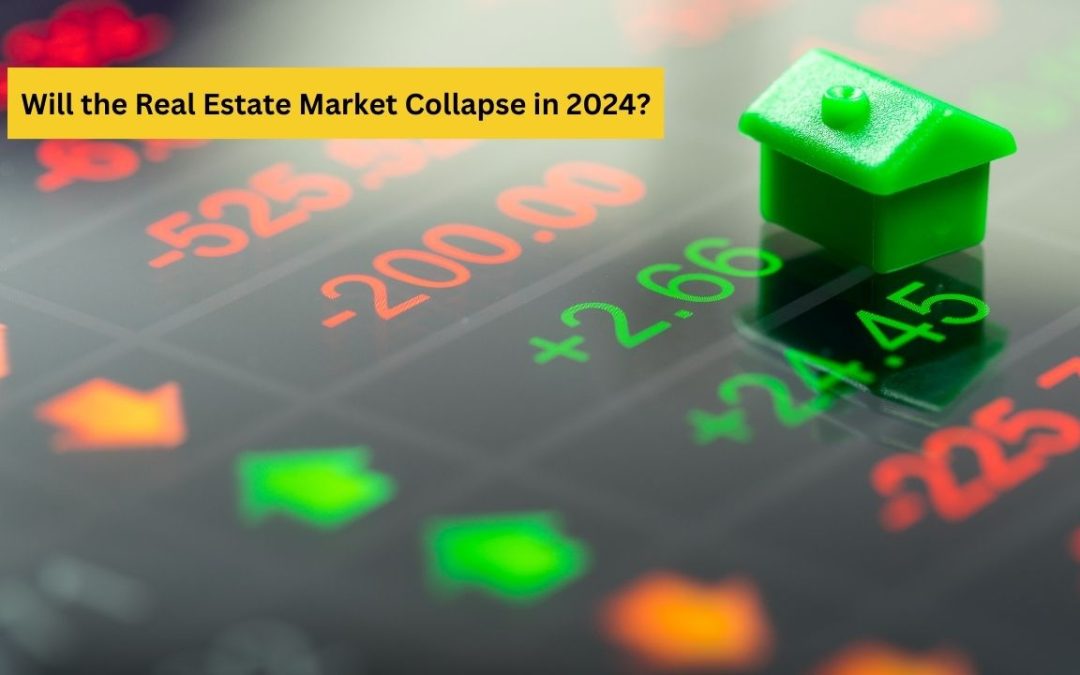By Brandon M. Scott
As we navigate through the complexities of the real estate market, one question looms large on the horizon: Will the real estate market collapse in 2024? Every buyer and seller is sitting on pins and needles unsure what to do and what decision(s) to make. It we stop and look back at the most recent data and forecasts from authoritative sources such as the National Association of Realtors (NAR), the Mortgage Bankers Association (MBA), and other relevant entities to gleam a prediction. Based on sleuthing, we’ll discuss the current state of the real estate market and offer a prediction for its future, with a special focus on the Washington, D.C. area.
National Real Estate Market Overview
The real estate market has always been subject to cycles of boom and bust, influenced by a myriad of factors including economic conditions, interest rates, and consumer confidence. Yet, never has real estate been a protracted victim to economic or other external forces. Data supports this, according to the latest reports from the NAR, the market has shown resilience in the face of challenges such as rising mortgage rates and economic uncertainty. While there has been a slowdown in sales and price growth, a full-scale collapse is not currently anticipated.
The Mortgage Bankers Association provides further insight into the market’s dynamics, highlighting that while mortgage applications have declined due to higher interest rates, the demand for housing remains robust, driven by a combination of low inventory and sustained interest from buyers. The MBA’s forecasts suggest a market adjustment rather than a collapse, with gradual stabilization expected as supply and demand find a new equilibrium.
Factors Influencing the Market
Several key factors will play a crucial role in determining the real estate market’s trajectory in 2024:
– Interest Rates: The Federal Reserve’s decisions on interest rates will significantly impact mortgage rates and, by extension, the real estate market. Higher rates could cool down the market by making borrowing more expensive, while lower rates could stimulate it. Recently, the Federal Reserve has signaled a pause on raising rates based on inflation approaching the 2% target. Many believe the question is when and not if, March or May.
– Economic Conditions: The overall health of the economy, including job growth, inflation, and consumer spending, will influence the real estate market. A strong economy typically supports a robust real estate market.
– Housing Supply: The current shortage of housing inventory has been a driving force behind the rapid price increases in recent years. Any changes in construction activity and housing supply will affect market dynamics but may not be in time to curb the Spring homebuyer season. Buyers entering the market will experience Covid-like competition and pricing.
– Government Policies: Legislative changes related to housing, consumer debt (student loan, medical debt) taxation, and lending practices can also impact the real estate market. Subsequently, government and lender grand and down payment assistance programs are seeing renewed funding offer some opportunity to some buyers.
Prediction for 2024
Taking together these factors along with the latest data and market assessments, the prediction for the real estate market in 2024 is cautiously optimistic. While challenges such as potential interest rate hikes and economic uncertainties exist, the fundamental demand for housing, coupled with a gradual increase in supply, is expected to prevent a collapse. Instead, the market may experience a period of adjustment with more moderate price growth and a balanced pace of sales.
The Washington, D.C. Area Real Estate Market
The real estate market in the Washington, D.C. area has its unique dynamics, influenced by factors such as government employment, the presence of numerous international organizations, and a diverse economy. The D.C. area has historically shown resilience in the face of national market downturns, thanks in part to its stable job market.
Thinking about what to expect for the D.C. area in 2024 is a continuation of this trend, with steady demand, especially in the more affordable and mid-range segments. However, luxury markets may see a slower pace due to a more significant impact from market adjustments. Overall, the D.C. area is expected to perform slightly better than the national average, with no collapse anticipated but rather a healthy adjustment to a more sustainable growth path.
While the specter of a real estate market collapse is a concern for many, current data and expert analyses suggest that a dramatic downturn is unlikely in 2024. Both nationally and in the Washington, D.C. area, the market is expected to undergo an adjustment phase, characterized by slower growth and a move towards balance. As always, potential buyers and sellers are advised to stay informed and consider their personal circumstances and the local market conditions before making decisions.
Brandon Scott is a licensed real estate agent in Washington, DC, Maryland and Virginia. His license hangs with Keller Williams Capital Properties in DC. He’s been involved in the mortgage finance industry for the last 22 years in various fields. You can reach him by email at [email protected]. Subscribe to his YouTube Channel at RealTeaDMV

